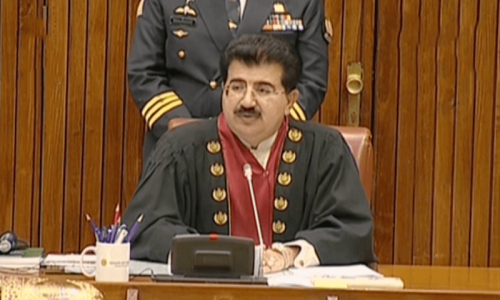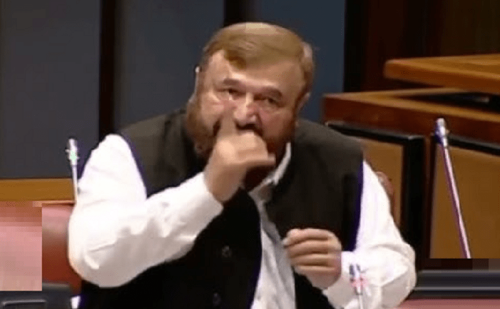ANYONE hoping to understand Pakistani politics needs to believe implicitly in miracles. He must admit that resurrections can occur and could happen again, and that a sea of adversity was parted once and would divide itself again. The return of Mian Nawaz Sharif to Pakistan on Oct 21 is nothing short of miraculous. Every legal obstruction is being removed from his path, hinting at neo-divine intervention.
To his PML-N followers, Nawaz Sharif is akin to a modern Moses promising to lead them into a Promised Land, with his brother Aaron by his side. A Jewish rabbi identified the differences between the two brothers as: “Aaron comforted the people. He spoke soothingly. He was the calm in the wake of the storm. Moses, by contrast, was the thunder within it.”
Those with a penchant for parallels will notice how neatly these cloaks fit the brothers — Nawaz, a man with a mission, if only to clear his name; Shahbaz the ambitious surrogate, the conciliator prepared to make peace even with a pharaoh.
Both will need to navigate a course carefully through the foreseeable turmoil leading up to the next elections and, more critically, the predictable mayhem that will follow the declaration of results, whenever.
Will Israel submit itself to international accountability?
Before previous elections, the PML-N team studied Theodore White’s analysis of the US presidential elections: The Making of the President 1960 (1961), and its sequels on the 1964, 1968 and 1972 jousts. From them, the PML-N culled a strategy of focusing on marginal constituencies. Safe seats were already in the bag. It was the undecided who needed PML-N’s help to make up their minds for them.
Today, one is not aware of a similar tactical plan developed by any of the political parties. They are relying on the broad blunderbuss approach to the more specific precision of the rifle.
The elections of December 1970 have been touted as the high-water-mark of ‘free and fair’ polls. After its waters had subsided, though, the resultant bedlam led to vivisection of a single Pakistan and the emergence of Zulfikar Ali Bhutto and Mujibur Rahman as elected supremos in its residual West and East.
At the time, a victorious Indira Gandhi resisted the temptation to absorb East Pakistan into a larger Akhand Bharat. She had enough Muslims within India to contend with.
Fifty years later, the Indians and Bangladeshis have collaborated again, this time on a newly released film Mujib: The Making of a Nation, an Indian-Bangladeshi co-production directed by Shyam Benegal. It has been sponsored by Mujib’s daughter, the current PM Sheikh Hasina.
Like Gurinder Chadha’s eminently watchable Viceroy’s House (2017) — a cine-drama recounting the events of 1947 —Benegal’s biopic is unlikely to be shown in Pakistan. Neither Bangladesh, nor Pakistan, nor India have fully exorcised the demons in their common past.
The crowd that greeted Mujibur Rahman when he stood with Bhutto in Shalimar Gardens, Lahore, during the Islamic Summit of 1974, is in its dotage. It can hardly remember Bhutto, leave alone Mujib.
In 1995, a post-apartheid South Africa taught the world the cathartic benefit of forgiveness. Its Truth and Reconciliation Commission enabled black, white and coloured South Africans “to come to terms with their past on a morally accepted basis”.
In 1945-46, the vengeful Allies gave the world the Nuremberg trials. Their purpose went beyond conviction of Nazi-tainted defendants. It was “to offer a history lesson to the defeated Germans, and delegitimise the traditional German elite”.
As no war is one-sided, “the judges were aware that both the Allies and the Axis had planned or committed acts of aggression”. They wrote “the verdict carefully to avoid discrediting either the Allied governments or the tribunal”. The verdict declared the plotting and waging of an aggressive war “the supreme international crime” because it contained “within itself the accumulated evil of the whole”.
Will the US, which has committed culpable genocide through the barrel of its dollar, ever subject itself to a Nuremberg-type trial? Will it answer to a tribunal of judges drawn from the numerous countries its “accumulated evil” has ravaged in Asia, the Middle East, and South America?
Will Israel, after it has obliterated the last particle of Palestine, submit itself to international accountability? Unlike the Jews who survived World War II to savour the cold revenge of the Nuremberg trials, the Palestinians have only the ghosts of their dead to draw upon to indict Israel.
Poets like Dylan Thomas sing what victims can only stutter: “Though they be mad and dead as nails, / Heads of the characters hammer through daisies, / Break in the sun till the sun breaks down, / And death shall have no dominion.”
Death continues to exercise dominion — now over Palestine, where harvests are drip-fed with the blood of Abraham.
The writer is an author.
Published in Dawn, November 2nd, 2023














































Dear visitor, the comments section is undergoing an overhaul and will return soon.